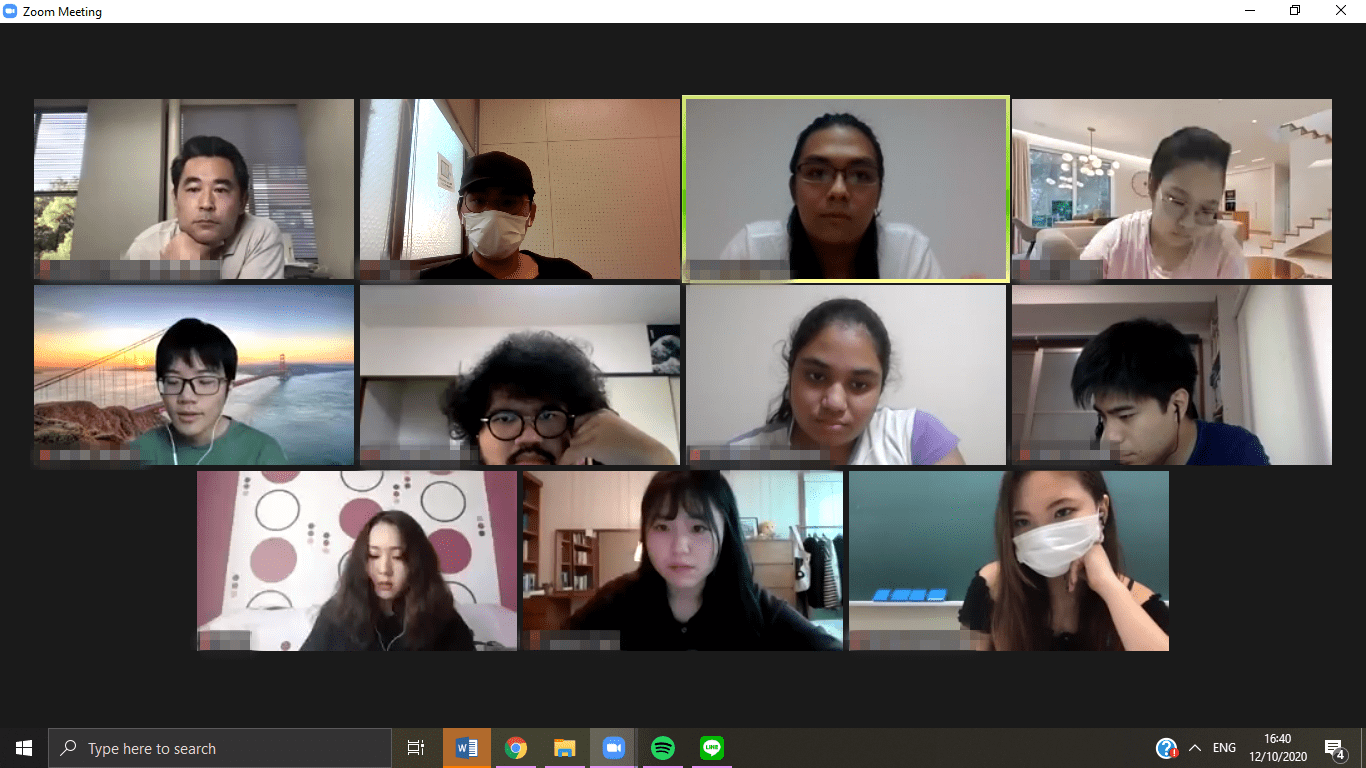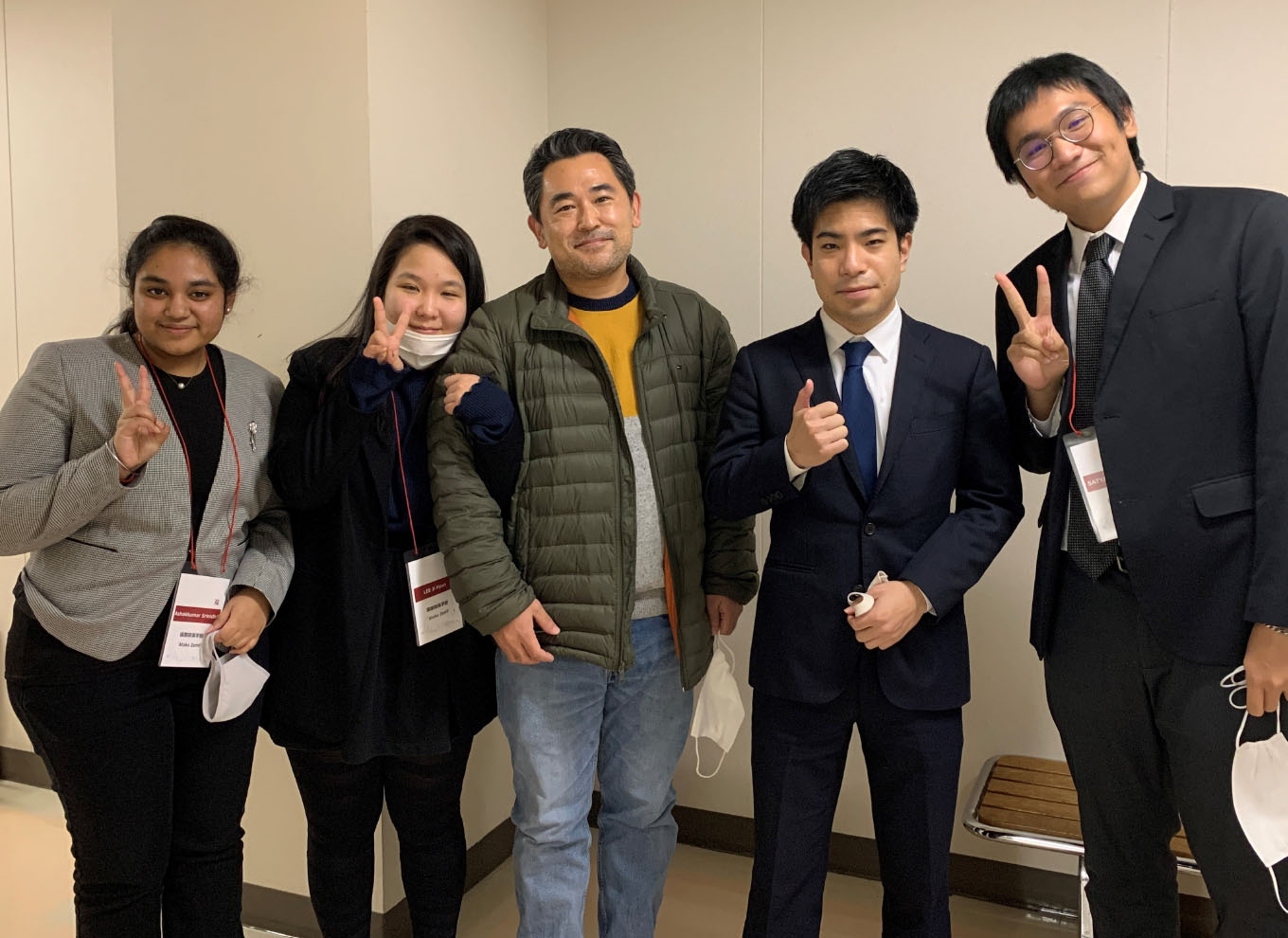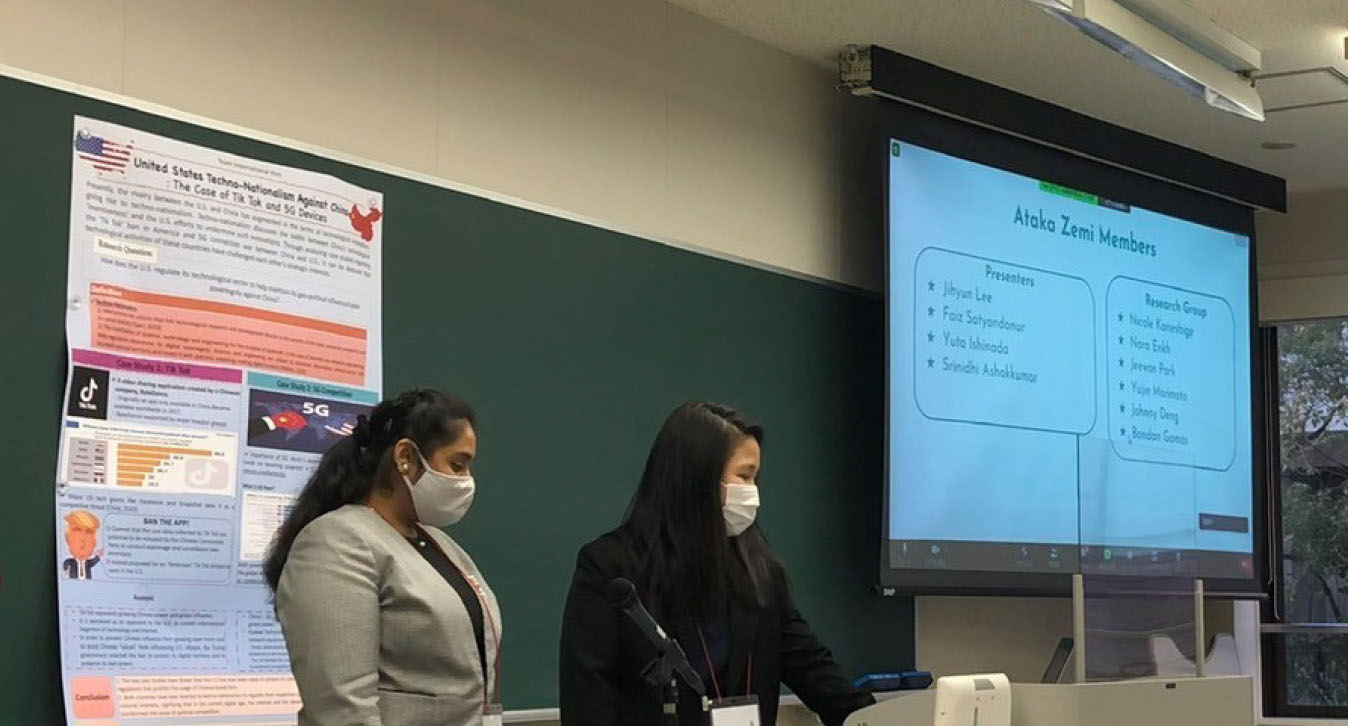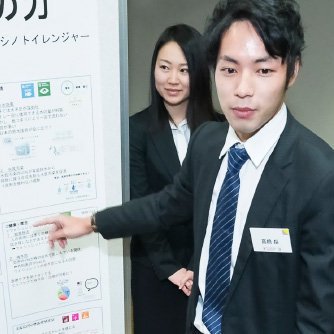Conflict on ‘techno-nationalism’ between America and China
Ataka-zemi chose the topic and shared research results in the Zemi Research Convention
SATYANDANUR Faiz
Fourth-year Global Studies Major
International Student from Indonesia (Center)
Third-year Global Studies Major
International Student from India (Left)
A team that consists of over 10 Global Studies major students in Ataka-zemi* participated in the Zemi Research Convention. Ask Faiz and Srinidhi, the leader and sub-leader of the team, about their experience.
*All students in the College of IR are required to take the Advanced Seminar course throughout their third and fourth years. Students belong to a seminar among more than 30 seminars, which are led by academic advisors specializing in specific fields. A seminar here corresponds to a research group and is often called “zemi” in Japanese, following the academic advisor’s name (e.g. “Ataka zemi” indicates a seminar led by Professor Ataka).
Related to our zemi’s theme of ‘Critical Approaches to International Relations’, we decided to investigate a topic with relevance to the current international environment.
What is the theme of Ataka-zemi?
SrinidhiUnder the umbrella of ‘Critical Approaches to International Relations’, we as a zemi examine and analyze theories, histories and issues of International Relations. As suggested by the theme of our zemi, we engage in ‘critical debates’ where we do not take for granted information presented to us. Instead we try to debate on theories and issues to un-wrangle the discord between how we understand such information in opposition to its implications and applicability in the world.
What is your research topic?
SrinidhiThis semester, we took up a sociological topic of ‘Race, Gender and Culture in IR’, and discussed perspectives of different authors and various theoretical approaches to unearth implications of these topics both in a historical context and in the current era.
What do you do in Ataka-zemi’s classes?
SrinidhiThroughout the semester, each of us take turns presenting to the class our assigned readings. From there, as a class we debate and analyze the main points presented in relation to its applicability and implications for the current world order. Additionally, we also get opportunities to present our own research regarding our thesis and get feedback from our peers. I think the biggest strength of Ataka zemi is that we get an opportunity to state our opinions in a friendly environment, making the discussion fun yet intellectual!
What was the presentation topic in the Zemi Research Convention? Why did you choose the topic?
SrinidhiRelated to our zemi’s theme of ‘Critical Approaches to International Relations’, we decided to investigate a topic with relevance to the current international environment. With the current coronavirus pandemic, much of the world population has spent increased time on electronic gadgets or social media. On that note, our research convection topic was regarding the conflict on ‘techno-nationalism’ between the world’s two superpowers: America and China. Techno-nationalism here discusses the battle between China’s technological ‘inventiveness’ and the U.S. efforts to undermine such innovations. For our presentation we discussed case studies regarding the ‘Tik Tok’ ban in America and 5G connection war between China and U.S., to show that technological activities of these countries have challenged each other’s strategic interests.

Due to the pandemic situation, a lot of us were back in our home countries and could not meet in person, that was a big challenge.
When and how did you start the preparation?
SrinidhiWe had started discussing participating in the Zemi Research Convention from the preceding semester, and one of our main reasons to participate was the encouragement and motivation by Professor Ataka. Once the Fall Semester started, with the new members of our zemi, we finalized on the topic. Our professor was kind to dedicate a few classes of our zemi in preparation for the zemi convention . We used to split ourselves into mini groups of 2-3 people, where each group will investigate on respective case studies. The remaining of us were in charge of the poster making. By dividing the tasks among ourselves, we were able to work in a smooth and coordinated manner in preparation for the Zemi Research Convention.
What was the challenge, and how did you work on it?
SrinidhiThe most challenging task for this year’s convention was that we all could not meet in person for the preparations. Due to the pandemic situation, a lot of us were back in our home countries and could not be physically present for both preparations and the event. Accommodating various time zones through an online environment was the most challenging task in terms of preparations. I think we were successfully able to overcome this task because of our dedicated and motivated zemi members!
What did you keep in mind when you gave a presentation? Did it work well?
SrinidhiAs it was a hybrid presentation, we had to keep in mind that we have audiences both online and offline! To accommodate both audiences, we had a poster presentation and a PowerPoint presentation and as presenters, we needed to ensure that we coordinate well between these two forms of presentations and that the audience do not feel ‘lost’. All we had in mind was to give our audience a fruitful experience with our presentation, and being cautious on our presentation techniques helped us to achieve our aim.
To accommodate our audience both online and offline and to ensure that we had no technical difficulties were the challenging tasks for us.
Please tell us what you learned from the presentation experience.
SrinidhiHaving researched on a recently blosomming topic, the amount of academic sources we could use to support our claims were rather limited. Despite our struggle, with the limited resources, I think that this experience taught us to formulate a rounded research at the convention. The considerable amount of audience to our presentation showed us that the relevance of the topic along with our arguments had reached our audience.
Please tell us what you found challenging.
SrinidhiRather than our preparations, I think that our biggest challenge came due to the hybrid format in which the convention was conducted. To accommodate our audience both online and offline and to ensure that we had no technical difficulties (such as if we were audible to the audience online) were the most challenging tasks for us. Also, as we were an English based zemi, we wanted to do our best in accommodating questions from Japanese audience as much as possible as well. In order to be able to do so, we ensured that presenters on the day were bilingual speakers of both English and Japanese.
Were there any impressive questions you received from the audience?
SrinidhiAs our presentations happened around the time of the U.S Presidential elections, during our preparation time we had President Donald Trump. However, on the presentation day, Joe Biden had been elected as the candidate. Due to this, the relevance of our research was questioned by the audience, and it was interesting for us to answer the question regarding the implications and relevance of the issue with the Biden administration.
Did you have a chance to listen to other groups’ presentations? If yes, which ones?
FaizOur team had the chance to listen to Nakamoto Zemi’s presentation.
Please share with us what you learned, noticed, or were impressed by their presentations.
FaizEven though we only had the chance to listen to Nakamoto Zemi’s presentation, we thought that the theme was very interesting and well-researched. Their topic was about harassment conducted through SNS, a theme that is often talked about in Japanese media. As our presentation was focused on international politics, it was interesting to learn about Japanese domestic issues through Nakamoto Zemi’s presentation.
What did you learn by participating in the event? How will it be related to your thesis and career?
FaizWe learnt how to divide tasks efficiently. As there were 10 people in our team, we had to communicate clearly with each other and divide the workload in order for us to complete the presentation. We think that this skill might help us in communicating with our co- workers in a business environment when we start working after graduation.

Do not be afraid in exploring topics that you are interested!
What was your new finding? How will it be related to your thesis and career?
FaizEven though our team members were interested in the topic, we did not have prior detailed knowledge about the politics behind the Tik Tok application. Thus, we were able to learn many new things related to the Tik Tok application and China-US relations through our research process. We believe that this will help us in gathering new information in a more detailed way in order to complete our own graduate thesis.
What was the challenge and finding as a leader or sub-leader of your team?
FaizWe did not face any challenges in this aspect as everyone was enthusiastic and willing to contribute to the team.
What was the challenge and finding in working as a team?
FaizBeing in contact with each other while working remotely. Half of our Zemi members are currently located in their home countries so we did not have the chance to meet in-person when doing our work. We were able to overcome this problem because we conducted Zoom video call sessions and talked to each other over the phone. We also communicated with each other in our Zemi LINE group chat, so we were able to still be in contact with each other even though we are unable to meet directly.
Do you think it was a good choice to participate in the event? Please tell us the reason why you think so.
FaizYes, we think that we were able to learn many new things and we were able to interact more with each other because of the event. Especially for the third-year students, it was a good learning experience for them as this is their first Zemi Research Convention event. Also, we felt relieved because many of the audience members expressed that they were able to learn new things about Tik Tok.
If you have any opinions/suggestions to make the event better, please share with us.
FaizWe hope that more GS Zemi teams will participate in the future.
How will you apply what you have learned to the future?
FaizAs we were exposed to many new information and concepts that we were not familiar with during the data collection process for the presentation, we will apply this mindset in our thesis research process as well. We hope that we will not be afraid to look for many interesting pieces of information that will be useful for our graduation thesis from now on.
Is there any advice for the participants in the next year?
FaizDo not be afraid in exploring topics that you have interest in, and make sure to appreciate your team members’ opinions and thoughts. Have fun and good luck!

MORE INTERVIEWS
-
International collaboration is not merely an ideal, but something that is both achievable and essential
Tran Duc Tuan (Steven)
Honda (Graduate School of International Relations Alumnus 2015)2026.2.13
alumni|
-
Zemi Research Convention 2025 “Where do we find the laughter?”
JDP Team
(Team name: The Japarican: Trans-Pacific Humor Accord)2026.2.3
academics|jdp|openseminar|
-
Diversifying opportunities and improving oneself by crossing borders
Jameel Mikaheel Yamaguchi
Fourth-year Global Studies Major2026.1.26
studyabroad|international|gs_major|
-
I participated in the Peace Studies Seminar and engaged in meaningful discussions with peers who shared a commitment to deepening our understanding of peacebuilding and broadening our perspectives.
ONG Kristen Valeria
Second-year Global Studies Major / International Student from Singapore2025.11.5
studentlife|academics|gs_major|
-
The Bangkok International Organization Training Program Taught Me the Importance of Understanding Regions from a Broad Perspective — I Aspire to Build a Career in International Politics
RINALDI Christian Giuseppe
Second-year Joint Degree Program (AU-home)2025.10.22
academics|international|jdp|
-
Developing my Japanese proficiency enabled me to engage in a wide range of experiences during my time in Japan.
DAO NGUYEN BAO Ngoc
Third-year Global Studies Major / International Student from Vietnam2025.9.26
studentlife|international|gs_major|
